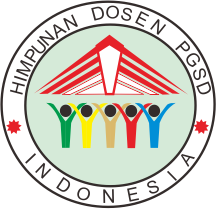The Internalization of Character Education in Learning for Generation Alpha: Fostering the Emergence of Indonesia's Golden Generation 2045
DOI:
https://doi.org/10.30595/dinamika.v17i1.26121Keywords:
Character Education, Generation Alpha, Indonesia’s Golden Generation 2045Abstract
Generation Alpha, born in the digital era, exhibits a high dependency on technology, which poses challenges to their social and emotional development. This study examines the importance of internalizing character education in the learning process to address these challenges. Using a literature review method, this study follows a systematic approach: topic identification, data collection, classification, analysis, and conclusion. Findings indicate that integrating character education into learning enhances social and emotional skills, supporting balanced development across cognitive, psychomotor, and affective domains. This integration is crucial for shaping Indonesia’s Golden Generation 2045—individuals who are intelligent, competent, and morally grounded. However, the study is limited by its reliance on secondary sources without empirical validation. Future research should explore the practical implementation of character education and assess its long-term impact on Generation Alpha’s development.
References
[1] Christiani, L. ., & Ikasari, P. . (2020). Generasi z dan pemeliharaan relasi antar generasi dalam perspektif budaya jawa. Jurnal Komunikasi Dan Kajian Media, 4(2), 84–105. Jurnal Komunikasi Dan Kajian Media, 4(2), 84–105.
[2] Faizah, H., & Khobir, A. (2021). Tantangan Pendidikan Di Era Millenial. In Jurnal Basicedu.
[3] Santosa, E. (2015). Raising Children In Digital Era. PT Gramedia.
[4] Hamdani, A. D., Nurhafsah, N., & Silvia, S. (2022). Inovasi Pendidikan Karakter Dalam Menciptakan Generasi Emas 2045. JPG: Jurnal Pendidikan Guru, 3(3), 170. https://doi.org/10.32832/jpg.v3i3.7291
[5] Murni, Y. (2016). High Concept and High Tought Senses in the Conceptual Age . Ini adalah konsep kunci. Inovasi Pendidikan, 2, 9–14.
[6] Anwar, F. (2022). Generasi Alpha: Tantangan dan Kesiapan Guru Bimbingan Konseling dalam Menghadapinya. At-Taujih, 5, 68–80.
[7] Yusuf, W. O. Y. H., Bustaming, W. W., Rahmatia, F., Zanurhaini, Z., H, S., Salawati, A. N., Yeni, Y., Rini, R., & Maliati, M. (2024). Pengasuhan Ideal Bagi Generasi Alpha Ideal Parenting For Generation Alpha. ARDHI : Jurnal Pengabdian Dalam Negeri, 2(1), 32–45.
[8] Hazmi, N. (2019). Tugas Guru dalam Proses Pembelajaran. JOEAI (Journal Of Education And Instruction), 2(1), 56–65.
[9] Fahrurrozi, F., Sari, Y., & Shalma, S. (2022). Studi Literatur : Implementasi Metode Drill sebagai Peningkatan Hasil Belajar Matematika Siswa Sekolah Dasar. Edukatif : Jurnal Ilmu Pendidikan, 4(3), 4325–4336. https://doi.org/10.31004/edukatif.v4i3.2800
[11] Baharizqi, S. L., Muhtar, T., Herlambang, Y. T., & Nur Fahrozy, F. P. (2023). Kompetensi Pedagogik Di Era Society 5.0: Sebuah Tinjauan Dalam Perspektif Pedagogik Kritis. Elementary School Journal Pgsd Fip Unimed, 13(2), 259. https://doi.org/10.24114/esjpgsd.v13i2.46286
[12] Purnama, S. (2018). Al Hikmah Proceedings on Islamic Early Childhood Education. Pengasuhan Digital Untuk Anak Generasi Alpha, 1, 1–556.
[13] Simanjuntak, R. (2019). Pentingnya Penerapan Kurikulum Berbasis Penguatan Pendidikan Karakter bagi Terciptanya Generasi Emas Indonesia Tahun 2045. Jurnal Teruna Bhakti, 1(2), 87. https://doi.org/10.47131/jtb.v1i2.17
[14] Yasir, M., & Susilawati, S. (2021). Pendidikan Karakter Pada Generasi Alpha: Tanggung Jawab, Disiplin dan Kerja Keras. Jurnal PkM Pengabdian Kepada Masyarakat, 4(3), 309. https://doi.org/10.30998/jurnalpkm.v4i3.10116
[15] Yulianti, Y. (2021). Pentingnya Pendidikan Karakter Untuk Membangun Generasi Emas Indonesia. CERMIN: Jurnal Penelitian, 5(1), 28. https://doi.org/10.36841/cermin_unars.v5i1.969
[16] Hale, M. (2022). Generation Alpha. EDULEAD: Journal of Christian Education and Leadership, 3(2), 240–245. https://doi.org/10.47530/edulead.v3i2.126
[17] Purba, G. H., & Bety, C. F. (2022). Menyongsong Generasi Indonesia Emas 2045 Melalui Pendidikan Karakter Berbasis ISEQ. Jurnal Kewarganegaraan, 6(2), 4076–4082.
[18] Jenuri, M. D. K. N. I. S. M. (2023). Transformasi Pendidikan Agama Islam dalam Membangun Karakter Mahasiswa Generasi Alpha. Jurnal Pendidikan Dan Konseling, 5, 989–995.
[19] Parai, N. (2023). Peran Orang Tua Terhadap Pendidikan Karakter Bagi Anak Generasi Alpha Dalam Menghadapi Era Metaverse Institut Agama Kristen Negeri Toraja , Indonesia The Role of Parents in Character Education for Alpha Generation Children in Facing the Metaverse Era. Jurnal Pendidikan Dan Teknologi Indonesia, 3(2), 73–80.
[20] Putri, R., & Madiun, U. P. (2024). Memahami Karakteristik Generasi Z dan Generasi Alpha : Kunci Efektif Pendidikan Karakter di Sekolah. 5.
[21] Anggraeni, D., & Juhriati, I. (2023). Gaya Pengasuhan yang Sesuai untuk Anak Usia Dini Pada Generasi Alpha. Jurnal Pendidikan Tambusai, 7(1), 3014–3020.
[22] Mahfuji, M., & Lastriani, K. (2023). Dampak Smartphone Terhadap Perkembangan Sosial Emosional Anak Usia 4-8 Tahun Di Desa Serang Kecamatan Cikarang Selatan. El Banar : Jurnal Pendidikan Dan Pengajaran, 6(1), 37–48. https://doi.org/10.54125/elbanar.v6i1.153
[23] Sahroni, D., & Malang, U. N. (2017). Pentingnya pendidikan karakter dalam pembelajaran. 115–124.
[24] Latifah, S. (2014). Integrasi Pendidikan Karakter Dalam Pembelajaran Di Sekolah. Jurnal Ilmiah Pendidikan Fisika Al-Biruni, 3(2), 24–40. https://doi.org/10.24042/jpifalbiruni.v3i2.71
[25] Purnamasari, D. G. N. I. D. A. Y. P. (2022). Integrasi Pendidikan Karakter Dalam Pembelajaran Pendidikan Kewarganegaraan Untuk Mengembangkan Karakter Peserta Didik Sekolah Dasar. SEHRAN (Jurnal Pendidikan Sejarah Dan Kewarganegaraan), 1(1), 65–74. https://doi.org/10.56721/shr.v1i1.123
[26] Angga, A., Abidin, Y., & Iskandar, S. (2022). Penerapan Pendidikan Karakter dengan Model Pembelajaran Berbasis Keterampilan Abad 21. Jurnal Basicedu, 6(1), 1046–1054. https://doi.org/10.31004/basicedu.v6i1.2084
Downloads
Published
How to Cite
Issue
Section
License
Copyright (c) 2025 Ida Darwati, Yunus Abidin, Ai Sutini

This work is licensed under a Creative Commons Attribution 4.0 International License.
Authors who publish with this journal agree to the following terms:
Authors retain copyright and grant the journal right of first publication with the work simultaneously licensed under a Creative Commons Attribution License that allows others to share the work with an acknowledgement of the work's authorship and initial publication in this journal.
Authors are able to enter into separate, additional contractual arrangements for the non-exclusive distribution of the journal's published version of the work (e.g., post it to an institutional repository or publish it in a book), with an acknowledgement of its initial publication in this journal.
Authors are permitted and encouraged to post their work online (e.g., in institutional repositories or on their website) prior to and during the submission process, as it can lead to productive exchanges, as well as earlier and greater citation of published work (See The Effect of Open Access).

Dinamika Jurnal Ilmiah Pendidikan Dasar is licensed under a Creative Commons Attribution 4.0 International License.













